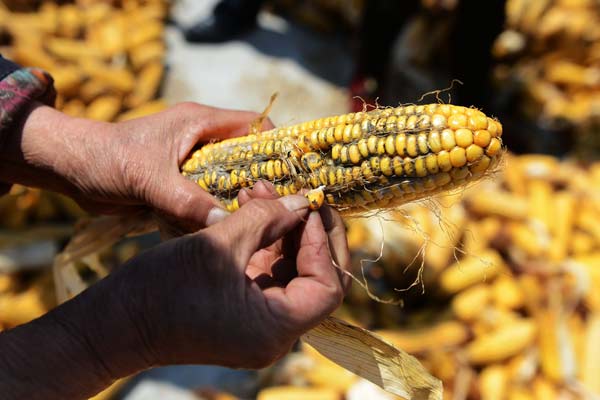Rain, snow may eat into grain harvest
Updated: 2013-05-11 01:52
By Zhou Siyu in Beijing and Liu Ce in Shenyang (China Daily)
|
||||||||
|
 |
|
Corn harvested in Luobei county, Heilongjiang province, last autumn has turned moldy as a result of excessive rain and snow in Northeast China, causing heavy losses for local farmers. Wang Kai / Xinhua |
Excessive rain and snow in Northeast China - the country's main grain-growing area - has delayed spring plowing by about 10 days, with some doubting that the country will achieve yet another increase in its grain harvest this year.
By Wednesday, 66.323 million mu (4.4 million hectares) of farmland had been ploughed, accounting for only 40 percent of the planned acreage, Heilongjiang Daily reported on Thursday.
In the worst-case scenario, reduced grain production will drive up China's food prices, increase the inflation rate in the second half of the year, and cause food prices to surge in the global market, analysts said.
Provinces in Northeast China have been hit with excessive rain since last autumn. In Heilongjiang province alone, the rainfall volume from Sept 1 to Nov 1 reached 151 millimeters, 70 percent higher than the average amount in previous years.
By March 28, the average winter precipitation in Heilongjiang province stood at 53.2 millimeters, 109 percent higher than the historical average, a record in 50 years, according to the province's meteorological bureau.
Local government and media in Heilongjiang said that more than 5.3 million hectares of farmland was waterlogged, and conditions in 3.2 million hectares of land were "serious" in the province.
"We are two to three weeks behind the usual time to plow the land and plant the seeds," said Yu Zhiwen, a 59-year-old farmer in Suihua, Heilongjiang.
Yu runs a plot of farmland with less than 3 hectares. Water in his plot reaches his ankles, making it inaccessible to either machines or farmers.
"The pump does not work. All we can do is wait for the weather to warm up and for the water to evaporate," Yu said.
Yu has a family of five, and all of his household's income comes from the land. In previous years, the land could produce at least 7,500 kilograms of corn per hectare, but he only expects about half of that amount this year.

 Michelle lays roses at site along Berlin Wall
Michelle lays roses at site along Berlin Wall
 Historic space lecture in Tiangong-1 commences
Historic space lecture in Tiangong-1 commences
 'Sopranos' Star James Gandolfini dead at 51
'Sopranos' Star James Gandolfini dead at 51
 UN: Number of refugees hits 18-year high
UN: Number of refugees hits 18-year high
 Slide: Jet exercises from aircraft carrier
Slide: Jet exercises from aircraft carrier
 Talks establish fishery hotline
Talks establish fishery hotline
 Foreign buyers eye Chinese drones
Foreign buyers eye Chinese drones
 UN chief hails China's peacekeepers
UN chief hails China's peacekeepers
Most Viewed
Editor's Picks

|

|

|

|

|

|
Today's Top News
Shenzhou X astronaut gives lecture today
US told to reassess duties on Chinese paper
Chinese seek greater share of satellite market
Russia rejects Obama's nuke cut proposal
US immigration bill sees Senate breakthrough
Brazilian cities revoke fare hikes
Moody's warns on China's local govt debt
Air quality in major cities drops in May
US Weekly

|

|







